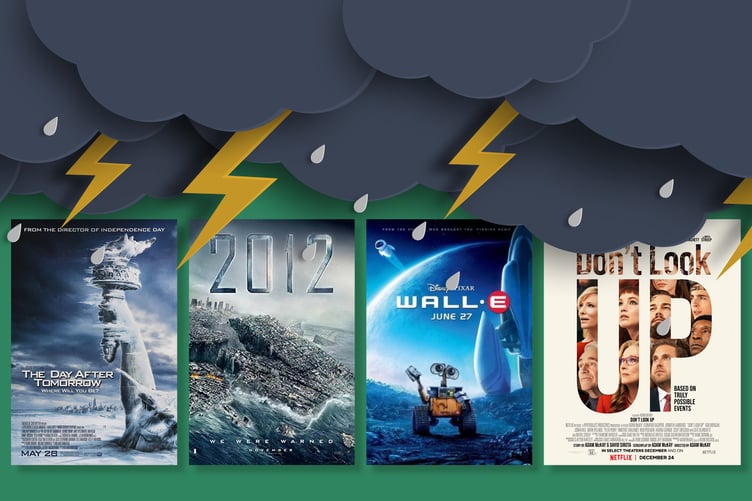Climate change is a huge, sprawling, complicated, continuous, destructive mess that can feel overwhelming. And when we feel overwhelmed, we often turn to films to find comfort. After the pandemic, Now TV released data showing a surge in the number of Brits watching post-apocalyptic and dystopian films like Minority Report, Contagion, The World's End, and 28 Days Later. Why? You'd think people would want to indulge in anything else to distract them from the chaos around them. #PitchPerfectonrepeat
But there's a comfort in watching disaster movies when the world outside is burning and you're feeling the heat. Films take overwhelming situations and give them a neat, tidy narrative, making it a lot more digestible and easier to wrap our heads around. We get a sense of control in the uncontrollable. We can walk away from it at the end because there is an end. Usually, the films finish with light at the end of the tunnel, giving us permission to believe everything will be okay.
In a time of massive tribal mentality, climate activists, climate deniers, and climate avoiders are pushed as far apart from each other as possible but there does seem to be something that has the ability to bring them all together: Disaster films. So, here are some of the top disaster films you can turn to if you're feeling overwhelmed or annoyed by climate change or are sick of watching Married at First Sight Australia.
The Day After Tomorrow
A huge storm hits, and a new Ice Age begins, leaving the world looking like a giant bag of garden peas that have been left in the freezer and forgotten about since 1997. It starts, naturally, with animals knowing something is wrong and huge flocks of birds randomly migrating, leaving people scratching their heads and saying 'huh, that's odd' then carrying on with their day. Dennis Quaid plays a palaeoclimatologist (someone who studies previous climates that have existed in Earth's history) and has his classic disaster movie moment of shouting at the political people in charge that 'if we don't act now it's going to be too late.' To which the politicians ignore him because he's just a stupid paloreosweatherologistthing. There are tornados, lightning that dramatically highlights the concerned gaze of a young Jake Gyllenhaal - the palohnoitsblowinabitofahoolietodayogist's son - massive floods, and some wolf attacks thrown in for good measure. Despite the bad weather, Dennis chucks on a coat and treks from Washington D.C. to New York City to rescue his son who's on a school field trip and now trapped inside a frozen building where the only way to keep warm is by burning books and flirting with his classmate. In the end, father and son are reunited along with the classmates and a random homeless guy with his dog. They're all picked up by military helicopters and, as they fly over the frozen city, they see spatterings of other survivors being picked up from frozen rooftops. They all share a smile, momentarily forgetting that their families and friends could be dead, as Jake's new gf rests her head on his not-so-cold shoulder. Jake and Dennis share a father son eye contact moment, with Dennis adding a little fond dad shake of the head before looking at the frozen world of death outside with a warm smile on his face. The film ends with astronauts looking at Earth through their rocket window and saying, 'the air is so clear.' So, despite the Earth going to sh*t and millions of people dying, a white, middle-class family has prevailed and the air has never been cleaner. Inspiring string orchestral music builds, and hope is reignited.
2012
This one has the same director as The Day After Tomorrow - Roland Emmerich - but is more full on. There are a lot more shots of people clutching their loved ones in their final moments on Earth before being obliterated by a ginormous tsunami, flying fireballs, or colossal earthquakes. Even the White House is taken out, so you know it's serious. The world leaders set about making arks for select people and animals, all the while, John Cusack, in a similar but less cold vein, does everything he can to save his white, middle-class family, just like in The Day After Tomorrow. In the end, millions of people die in horrible weather but it's okay because John gets his nuclear family, including the pet dog, on an ark. Scientists say the mass amount of water that has flooded the globe is receding at an optimistically fast rate and they're off to Africa where there's been less flooding. John and his family - none of whom have a single scratch on them - share a little joke as they stand on the bow of the ark looking out onto the now peacefully still sea. Inspiring string orchestral music builds and hope, yet again, prevails.
Wall-E
The world has ended in a sprawling mass of rubbish. After becoming too trash-covered to support life, all humans were invited on a space cruise and now only one adorable resident, Wall-E the robot, remains. He has lived on the plastic-filled, capitalistic remnants of Earth alone for the last 700 years going about his job - to compact rubbish into cubes and stack them- UNTIL a sexy robot called EVE touches down on the planet and whisks him away. They go on a mission to save Earth, falling in love and dancing to old music from simpler times in the process. The soundtrack is beautiful. During their mission they interact with the space cruise humans, who are now all too overweight to walk. Instead, they move around a screen-laden ship which constantly flash adverts about buying products to boost the economy via floating chair in a laid back position, screen directly in front of their face, set up with speaker systems so they don't have to talk to anyone in person, and buttons at their fingers so they never have to move when they buy the multitude of products being sold to them on-screen, all while they have fast food continuously delivered to them. Everything is literally at their fingertips, so they never have to move a muscle. In the end, the captain of the ship takes the humans back to Earth and we see him teaching his shipmates about farming; a single, pure green shoot is seen rising from the dusty ground. Hope springs once more.
Don't Look Up
We've had the dramatic disaster films in The Day After Tomorrow and 2012 and the quietly reflective disaster film in Walle-E, now it's time for some comedy. Jennifer Lawrence and Leo DiCappuccino play two astronomers who discover an approaching comet that will destroy the Earth. The film follows them trying to convince the coke-snorting president, along with everyone else, to take the impending destruction of the whole human race seriously and believe the scientific evidence they're providing. Instead, Leo gets lauded a sexy scientist and garners fame, while J-Law is ridiculed on socials as a screechy, crazy lady. Go figure. In the middle, the politicians and rich people try and get minerals from the incoming comet in an attempt to make billions of dollars from it, not caring that they won't be able to use the money when they're a smouldering smudge mark on the ground. In the end, after letting fame go to his head, Leo comes back around and spends his final night on Earth with his nuclear, middle-class family, along with his scientist mate, J-Law and her new boyfriend played by Timothee Chamalamadingdong. The comet hits. Everyone is wiped out bar the rich people and politicians who have sorted themselves a spaceship to another planet. When they arrive they are quickly eaten by the giant birds living there that they immediately tried to pet.
So, there you go, a small sampling of escapist disaster movies for you if you're starting to fret about the constant rain and rising sea levels surrounding our tiny Island. Just pop one of these on and it'll all be alright. So, long as you're part of a white, middle-class nuclear family who own a dog. Otherwise, you're screwed so you're probably better off watching Pitch Perfect instead.





Comments
This article has no comments yet. Be the first to leave a comment.